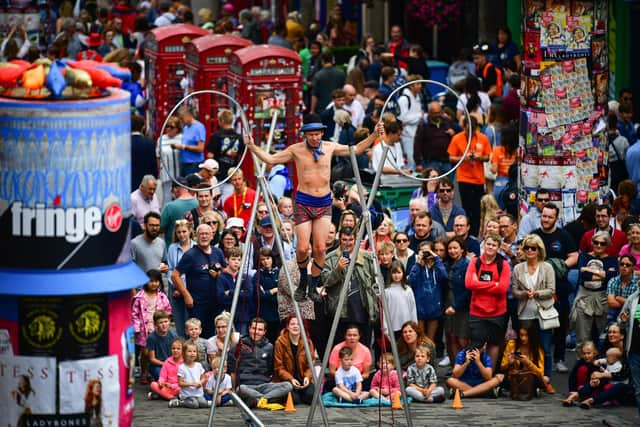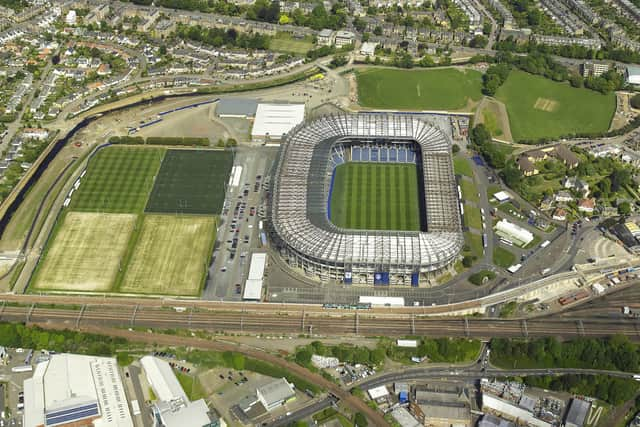Edinburgh festivals: Cockburn Association wants them to return but in a way that works for all – Professor Cliff Hague
Our recent conference and annual lecture – Whose Festival is it Anyway? – posed the question, how can we regain the benefits that Edinburgh’s many festivals bring to the city? What can be done in 2021 and how should that shape the way ahead? How can we reconnect local communities to our festivals?
This year will be a transitional one by necessity. It should be used to refocus and experiment, contributing to both the short-term recovery but also to the future resilience of the city and its economy.
Advertisement
Hide AdAdvertisement
Hide AdThe Cockburn Association wants to get the festivals back. A combination of vaccinations and falling rates of transmission will pave the way for activities with the reasonable expectation that outdoor events will be possible first followed by indoor events in well-ventilated places and with safe social distancing.
But that is not the same as aiming to recreate 2019; caution is appropriate since we must be sure that they will be safe, inclusive and environmentally sustainable.
Everything wasn’t perfect in the years preceding Covid. City council reports highlighted serious capacity problems, with local people “unable to get on with their lives” and increasing negativity towards the city’s tourism and festival economy.
The erection of a huge deck in 2019 for the Winter Festivals in East Princes Street Gardens, with seeming impunity to the city’s planning regulations, was symptomatic of what had gone wrong.
The pandemic has shown just how valuable our parks and green spaces are for our collective mental and physical well-being. For the Cockburn, it makes no sense to restrict access to our public open spaces for weeks on end to facilitate commercial events. Is it really necessary to let a private company close off much of West Princes Street Gardens during August for the Summer Sessions concert series, just when public access is at its peak?


In many cases, these have inflicted serious damage to cherished public parks, making them unavailable for use for substantial periods as reparative works are undertaken. Re-turfing is a sticking plaster, not a cure, for the destruction imposed.
A strategic approach to the use of civic spaces is required. Hard standing areas more suited to large events need to be prioritised. This could contribute to a different geography for the festivals. Could festivals and major events in 2021 be staged in car parks at shopping centres or beside Murrayfield or Tynecastle?
The city centre concentration has also led many suburban residents to feel that the festivals pass them by, while generating unprecedented levels of dissatisfaction amongst other residents whose concerns have come a poor second best to the pursuit of tourist numbers. Refocusing on community-level, locally supported initiatives would help reconnect the festivals to the city.
Advertisement
Hide AdAdvertisement
Hide Ad

Wider environmental conditions, on for example the use of diesel generators and single-use plastic containers for drinks, should be imposed, helping meet declared net-zero carbon targets. This should be the year for our festivals to take a decisive step towards going green, that can then be developed further in later years.
We all have a duty to the city. We are its temporary stewards. We need to care for its buildings and spaces, while ensuring that all can enjoy the buzz and culture it can offer.
Edinburgh is more than just a space to absorb as many visitors as possible. It is more than a backdrop or a stage-set to add a premium to events and performances.
We should be nourishing creativity and culture across the city as a whole. That means de-concentration and dispersal of festival events, in consultation with community organisations on what conditions events will be staged. Involve schools and aspiring performers. Go local and be inclusive by spreading the excitement more widely than ever before.
The city council aspires to create the “20-minute neighbourhoods” in which a wide range of services are accessible close to people’s homes. Why can’t the festivals blaze a trail this year in showing how this could work for culture and entertainment?
On holiday afternoons, performers could lead kids and their parents around their streets and playgrounds telling stories, exploring local history, buildings and ecosystems or showing how to reduce carbon dependency.
The indirect and unintended impacts also need to be addressed. Edinburgh has become the short-term-let capital of Britain, with more than 6,500 homes now offered for holidays.
This loss of housing was fuelled by the ‘growth for growth’s sake’ tourism strategy. Displacement of city centre residents is the result. A lived-in city is a sustainable city. It is a safe city. It is also a city that enhances the visitor’s experience.
Advertisement
Hide AdAdvertisement
Hide AdThe festivals can provide huge support to the many Edinburgh citizens left seriously hard up and distressed by loss of earnings and home confinement this last year. A fundamental principle of supporting local businesses first and foremost should be in place, resisting ‘pop-up’ or ‘brought-in’ elements that compete with them.
Finally, let’s keep a sense of perspective. Edinburgh’s festivals and tourism are a part of a much larger city economy. Recovery depends on innovation while sustaining and growing the jobs in health, education, public administration, finance and business services that are the 12-months-a-year basis for the capital’s prosperity and fundamental to our quality of life.
More than temporary jobs in the gig economy or the rental of flats to holidaymakers, these are the sectors that make Edinburgh’s economic heartbeat.
Professor Cliff Hague OBE is chair of the Cockburn Association
A message from the Editor:
Thank you for reading this article. We're more reliant on your support than ever as the shift in consumer habits brought about by coronavirus impacts our advertisers.
If you haven't already, please consider supporting our trusted, fact-checked journalism by taking out a digital subscription.
Comments
Want to join the conversation? Please or to comment on this article.